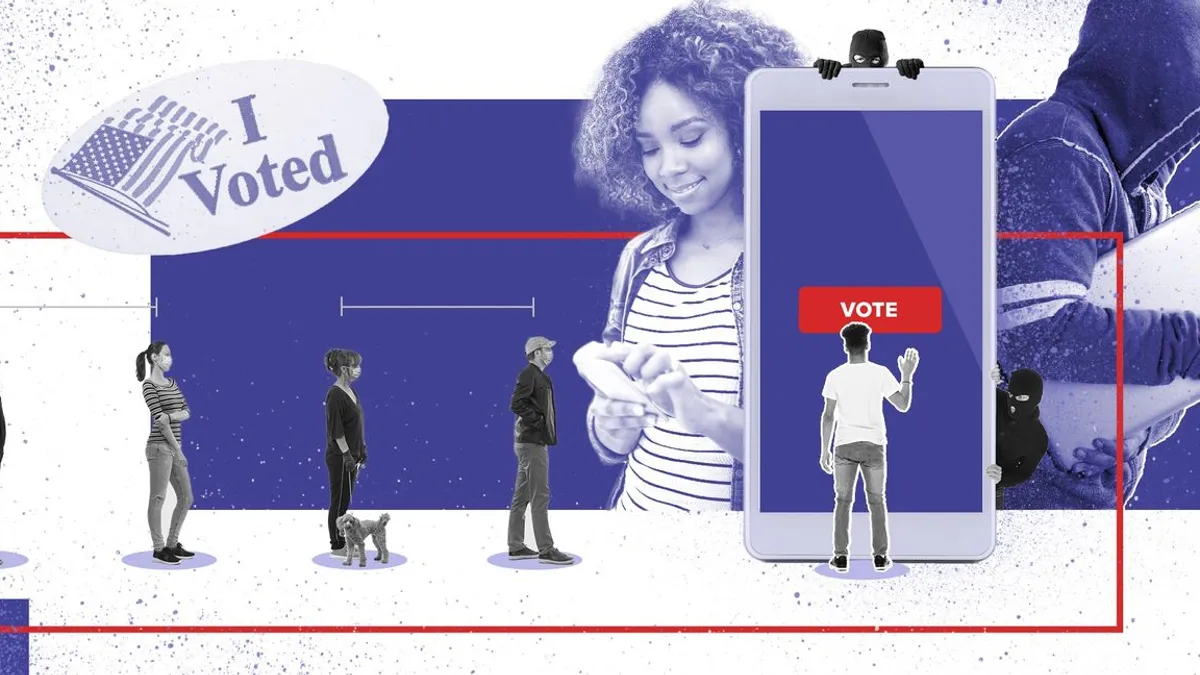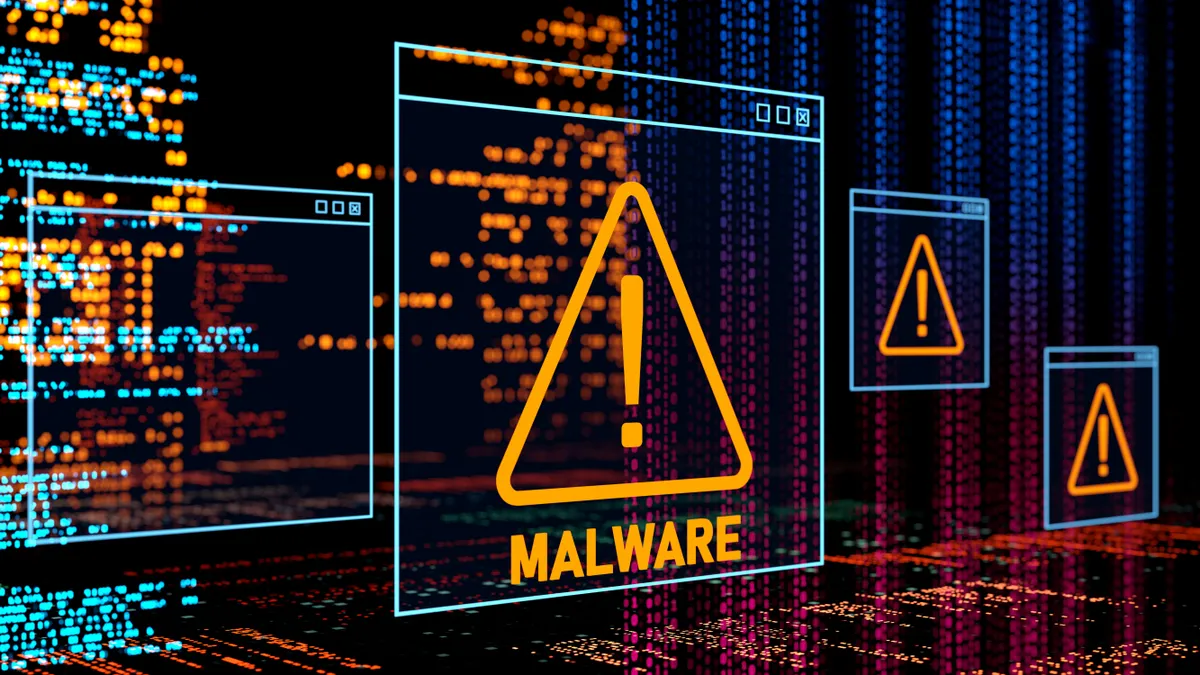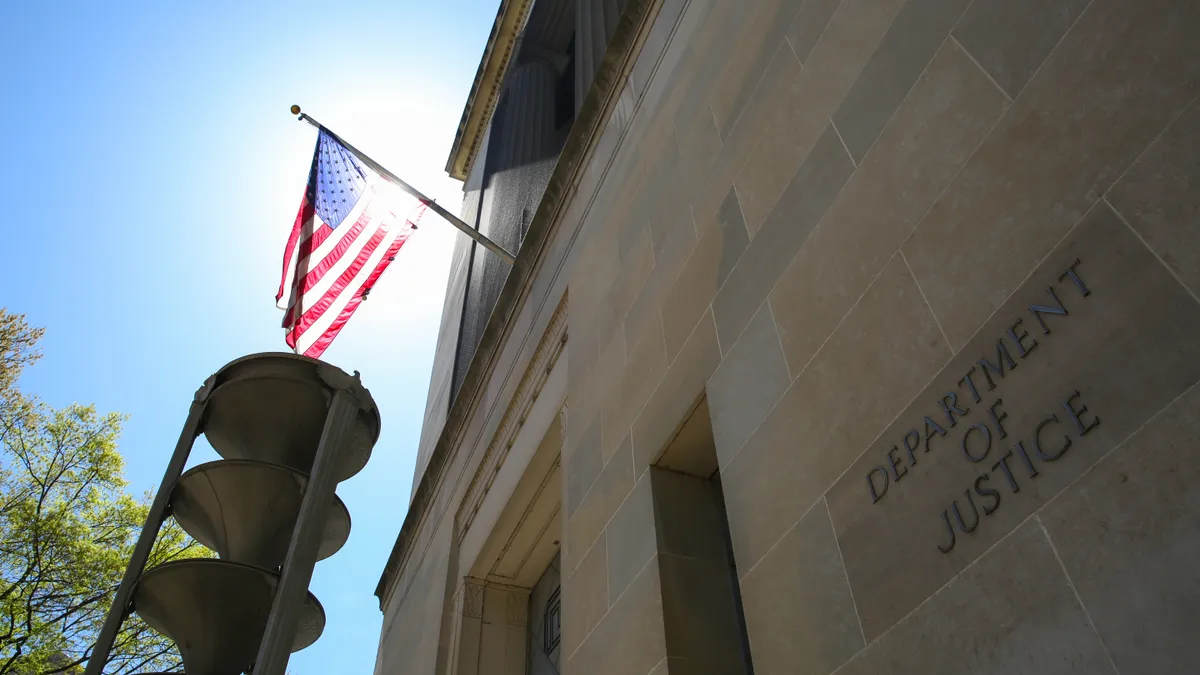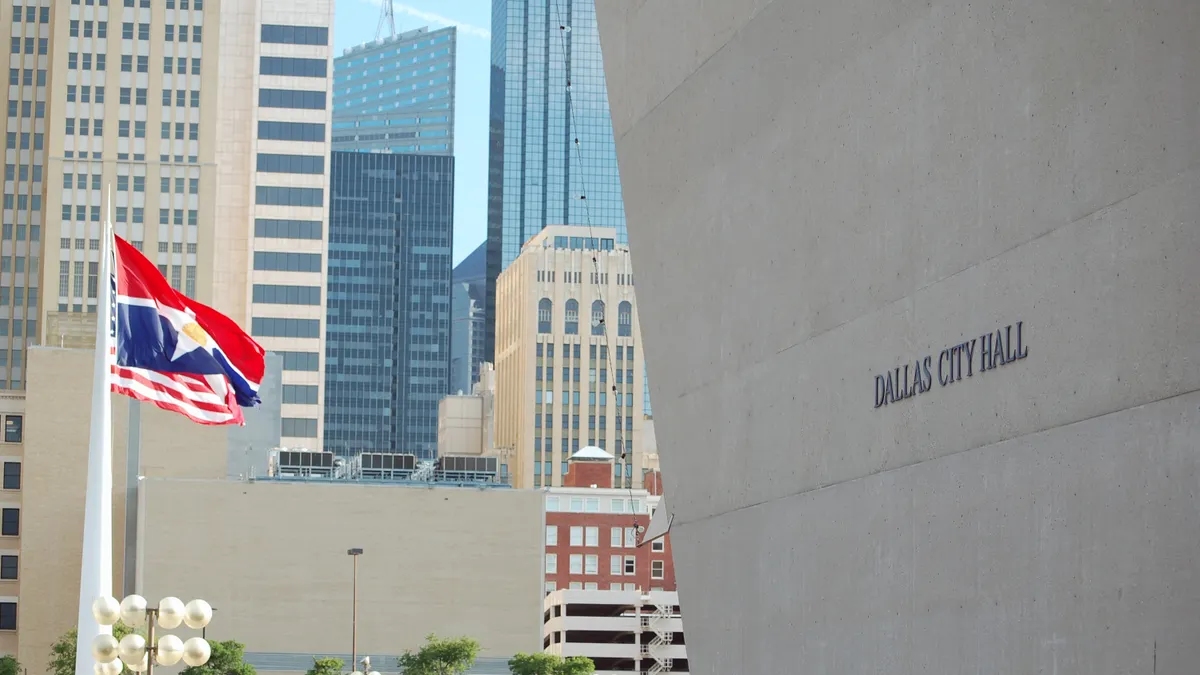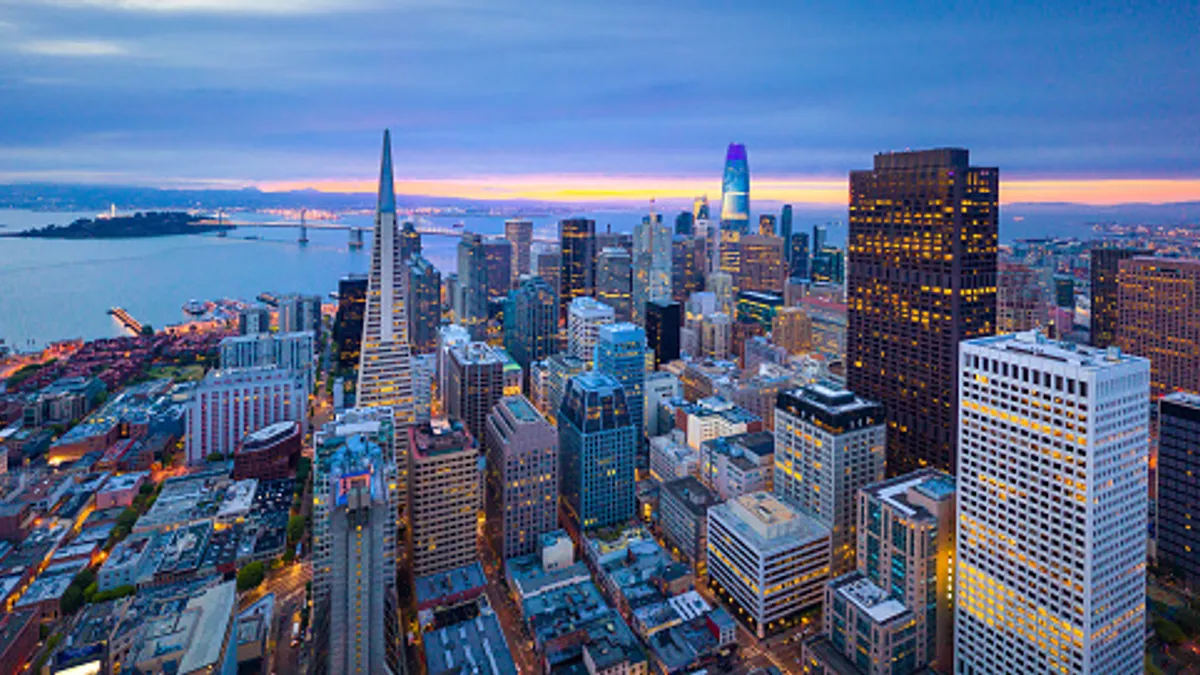Milwaukee voters stood just inches apart in lines that stretched for blocks outside of voting centers on April 7, all waiting to cast ballots in the state’s presidential primary.
On a typical Election Day, passersby wouldn’t bat an eye at this scene. But on this Election Day — and every that has passed since early March — the prevalence of COVID-19 has raised health and safety concerns that leave some voters weighing the value of health versus that of participating in the democratic process.
The proximity of Milwaukee’s voters followed Wisconsin Gov. Tony Evers’ last-minute attempt to postpone the primary, as other states had done. The effort was blocked by the state Supreme Court, and as a result, only 3% of Milwaukee’s polling sites opened to serve a population of nearly 600,000.
Norman Ornstein, resident scholar at the think tank American Enterprise Institute, told Smart Cities Dive there are many states with leaders who are "either ignoring the risks or deliberately trying to tilt the balance to suppress voters."
"We’ve seen that in Wisconsin, and I think we're going to see it in other places as well," he said.
Two months later, similar concerns arose when Kentucky slashed its number of polling sites from 3,700 to 200, due to an inadequate number of poll workers available on Election Day — an issue also experienced in Wisconsin. Voters at the Kentucky Expo Center in Louisville (the only polling location in Jefferson County) demanded entrance to the building after the location apparently closed at 6 p.m. on June 23. A judge later clarified that voters were intended to have access to the polling location until 6:30 p.m, according to The Hill, and that those who arrived in time were eventually let in.
The people want to vote. pic.twitter.com/ATYDrQcS3L
— jacob ryan (@jacobhryan) June 23, 2020
The novel coronavirus has triggered unprecedented shutdowns to curb public transmission of the disease and economic disruptions across the globe. In the United States, it has also upended the democratic process during a presidential election year, forcing local officials to scramble to develop alternatives to in-person voting.
The ramp-up
After a weeks long decline in COVID-19 cases across most of the U.S., infections have once again spiked to record highs, with single-day new case totals nearing 53,000 on July 1. Four states still have upcoming primaries as of publication — Connecticut, Delaware, Louisiana and New Jersey — and leaders face mounting pressures to develop solutions that will keep voters safe, both now and in the November general election.
That includes deciding whether the increasingly controversial option of mail-in ballots and new technologies, such as voting by mobile device, are ready for primetime.
"If we're still facing some kind of health threat [in November], there will be populations, including those with disabilities and those with preexisting conditions, who are not going to go to polling places. You have to provide alternatives," Ornstein said.
Twenty-five states held state or presidential primary elections in February and March before the pandemic’s effects gripped the United States. By the time residents in Arizona, Florida and Illinois headed to the polls March 17, federal and state governments had begun taking measures to address the new health crisis that was ramping up quickly.
Officials suddenly faced appeals to postpone or alter primaries. Illinois Gov. J.B. Pritzker fielded criticism for mandating bars’ closure a day before the March primary but not postponing the election itself. He said state law prevented him from taking that kind of action.
After that point, officials nationwide scrambled to adjust their own elections in ways that would ensure citizen safety while preserving voting rights.
Some polling places added prevention measures including social distancing and face mask use, while others including Marion County, IN, home of Indianapolis, set up plexiglass barriers to further protect poll workers. The county also provided voters with latex finger coverings for use at the touch screen voting booths, said Russell Hollis, deputy director of the Marion County Clerk's Office.
Many jurisdictions also experimented with curbside voting or relaxed criteria for in-person absentee voting to alleviate crowding on primary day. More than a dozen states postponed their state or presidential primaries. A few canceled in-person voting entirely and switched to mail-in ballots only.
Presidential primary election dates in each state
Though these changes have been viewed as necessary by nearly all stakeholders, analysts caution leaders to be thoughtful when implementing changes and to thoroughly communicate adjustments to prevent complications among the public.
"Any change you make creates the opportunity for confusion and that voters won't get the chance to understand the change," said Suzanne Spaulding, senior advisor for homeland security at the Center for Strategic and International Studies (CSIS). "It creates a really tempting opportunity for bad actors to exacerbate disinformation."
Moving to mail
The recent widespread adoption of mail-in voting options across the U.S. have resulted in hotly contested political issues.
Five states — Colorado, Hawaii, Oregon, Washington and Utah — offer "all-mail" systems in which every voter receives and submits a ballot by mail. Election officials are careful to distinguish these processes from other jurisdictions’ altered 2020 systems which are not technically all-mail, but rather expansions of existing absentee voting.
There is a clear distinction between all-mail systems, and absentee systems that require an engaged voter to request a ballot, said Mike Queen, deputy chief of staff and director of communications for the West Virginia Secretary of State’s Office. Such engagement is a key element to ensure voter confidence, Queen said.
"If people don't have confidence in the ballot process, then they won't have confidence in the outcome of the elections," he said, noting that West Virginia opted not to transition the system to entirely mail-in because "voting by mail just doesn't have the same confidence level."
Yet during the pandemic, national demand for vote-by-mail is booming in myriad jurisdictions. Marion County mailed 123,000 ballots to voters who requested them, compared with about 6,000 in 2016, while West Virginia had requests for 278,000 ballots ahead of the primary, compared with 6,500 absentee vote-by-mail ballots in 2016.
Some election officials suggest vote-by-mail will only become more popular.
"A mailed ballot is something used in over 33 states around the country. That's what the future looks like," said Baltimore City Election Director Armstead B.C. Jones.
Baltimore tripled its number of ballot drop boxes to accommodate the absentee ballot program expansion. The boxes are guarded by police and a private security firm at all times to prevent tampering.
"A mailed ballot is something used in over 33 states around the country. That's what the future looks like."

Armstead B.C. Jones
Baltimore City Election Director
Some people fear mail-in ballots are still more prone to tampering. Election officials say that while the risk is relatively low, it is even lower with in-person voting, as absentee ballots are harder for election officials to verify. Reliability of mail service is also a considerable issue when ensuring citizens have ample time to submit ballots by the deadline.
"A major concern of mine is that quite a few voters had conversations about not receiving ballots. Well, about 20,000 ballots in the City of Baltimore were undeliverable ... because people move and don’t change their address, get married and don’t change their name, are deceased — a variety of other reasons," Jones said.
Marion County reported delays in getting all of its requested ballots out to citizens, partially due to processing delays at the County Clerk's Office — some of which were caused by coronavirus-related staff reductions.
"We could not dedicate the resources needed to vote-by-mail because we were also planning for substantial in-person voting for Election Day. It limits what [a jurisdiction] can do for processing mail and the ballots received," Hollis said. "It's not only Marion County, but throughout the country."
Cities, states and the U.S. Post Office all are not equipped to handle a mail-in ballot surge in November, Ornstein warned. "There are all kinds of reports suggesting the postal service is on the verge of a complete collapse. We’re not able to vote by mail if there is no post office or it is in disarray. We need security," he said.
Difficulties are also becoming evident as some election offices receive ballots days or weeks late, which can delay election results. This has implications for November if mail-in absentee ballot programs further expand, considering general election participation is usually much higher than that of primaries.
And despite potential solutions to prepare for this surge in demand, cities nationwide are facing budget crunches — and elections rarely are a top priority for allocating additional resources.
"Is money going to go toward more efficient garbage collection, which happens once a week, or elections that might take place once a year? The answer is, they’re not going to put a lot of money into our voting infrastructure," Ornstein said.
Turning to tech
Numerous cities and states are testing technologies to modernize election processes and increase voting accessibility, especially for underserved populations. Yet technology’s rate of change poses a challenge when married with the infrequency of elections.
Dozens of jurisdictions are experimenting with mobile ballot submissions for limited populations. Citizen and military voters overseas are prime candidates for this tech as an alternative to the standard practice of faxed or emailed ballots, both of which are suboptimal and less secure than other modes.
Officials specify that these technologies are not truly "mobile voting" because votes are not cast and tallied in the cloud. Rather, voters fill out a ballot on a mobile device and sign it digitally to verify identity before the ballot is electronically sent to election officials who download, print and count it manually like a traditional ballot.
Delaware is currently running a pilot with elections tech company Democracy Live to allow overseas military and citizens and people with disabilities to submit mobile ballots. The effort furthers the state's ongoing work over the last decade to offer these citizens accessible electronic voting options.
Delaware is also beefing up its entire online voter portal to make it more user friendly and to better integrate all online voting elements — from polling site information to electronic ballot delivery and return — with the new system.
"As there’s more demand for absentee ballots, we’re trying to make it more convenient," said Delaware State Election Commissioner Anthony Albence. He defended the security of mobile ballot submissions, saying the production of a paper ballot at the end of the process makes it "auditable and trackable."
In 2018, West Virginia became the first state to trial blockchain-enabled voting app Voatz during an election through a small pilot with members of the military, citizens overseas and people with disabilities.
"It was the first time that many of our voters with disabilities were able to vote through a ‘secret’ ballot," Queen said, as opposed to a caretaker or assistant filling out the ballot.
Once a Voatz user fills in an absentee ballot request to download the app, they set up an account with a multifactor authentication and verify their identity with a government-issued ID and a selfie. The system then tests for "liveness" in the photo and uses facial recognition to ensure the selfie matches the ID. User information is deleted from the Voatz system once the user is verified and proceeds with voting.
Each mobile ballot creates three records to ensure the vote is submitted and counted correctly, and it is audited. One measure is for elections authorities to print a paper version of the ballot.
The company has received an uptick in interest from potential customers amid the pandemic, Voatz Chief of Staff Hilary Braseth said.
"What often gets overlooked is [election system] resilience… There's not room for a pandemic in the landscape of elections. Everyone is scrambling to figure out how to vote safely this fall," she said. "We see the future as younger generations demanding a way to verify their own vote. That's the paradigm we're building toward. And everyone can participate in auditing."
Like all new voting technology, Voatz’s system has been met with some skepticism. Earlier this year, an MIT study identified vulnerabilities within the app that could allow interference from hackers. The researchers reverse engineered the app and found that "an attacker with root access to a voter’s device can easily evade the system’s defenses, learn the user’s choices (even after the event is over), and alter the user’s vote," the researchers stated in a technical paper. "We further find that their network protocol can leak details of the user’s vote, and, surprisingly, that ... the system’s use of the blockchain is unlikely to protect against server-side attacks."
Braseth said that Voatz strongly disagrees with the study findings and methods, as the MIT researchers did not use the actual app but instead tried to reverse engineer an Android application of the system that had only a hypothetical connection to servers. She also said the research was published without being peer reviewed.
"We're definitely under a microscopic lens, and with good reason," Barseth said. "We take what we're doing seriously. Democracy is not something we should be haphazardly treading into."
West Virginia has stopped using Voatz and entered into a pilot with Democracy Live. Queen says election officials want to try numerous mobile vendors before settling on just one.
"We take advantage of technology in everything we do, not just for sake of using technology, but expanding the number of voters who can participate. That's our job: Make it easy to vote and hard to cheat," Queen said.
Setting sights on security
Technology is expected to become more prevalent in future elections, and while mobile voting technologies face criticism for vulnerabilities to cyberattacks or tampering, tech advocates say no voting method is truly secure.
"Is it 100% safe? Absolutely not. But neither is voting in person," Queen said.
Risk mitigation involves determining how secure each mode of voting is at scale, and CSIS' Spaulding said jurisdictions must proactively plan for the possibility of mobile and online voting in future elections to prioritize security.
"Blockchain is not a 100% solution to prevent malicious cyber activity, but it is certainly a step in the right direction for chain-of-custody transactions," she said.
Meanwhile, vote-by-mail has its own security concerns, but mainly it suffers from a lack of public confidence, which could result in the courts handling more conflicts in the remaining primaries and the November general election.
Many analysts also fear a factor that affects both elections and courts: nefarious outside actors. The 2016 election brought to the spotlight suspected Russian interference in U.S. elections, and the same concerns exist for 2020. Russia and other entities are being investigated for their suspected roles in spreading disinformation to erode public trust in U.S. institutions such as the courts.
"Increasingly, the message is put out there that the courts are political," Spaulding said. "A big concern is whether at some point that gets to the level where a sizable population no longer gives legitimacy to courts' opinions … If people don't respect the system, they might not respect the outcome."
Assuring the public’s trust in election outcomes and mitigating risk is exactly why West Virginia’s Secretary of State prefers a blended voting model to an all-or-nothing system. The state will never use a lone voting mode, Queen said.
Analysts recommend jurisdictions identify transparent options that voters will consider credible, such as extending in-person voting to multiple days and further expanding mail-in options. Widely expanded curbside voting supported by automation and smart ID cards also has potential, "but we're not going to have that by November, and that is a real concern," Spaulding said.
Regardless of whether contingency plans must be used in November, analysts say election officials can't afford to wait until the last minute to ensure a safe, secure and accessible election.
"If we don't make changes far in advance, there is going to be big trouble," Ornstein said.



